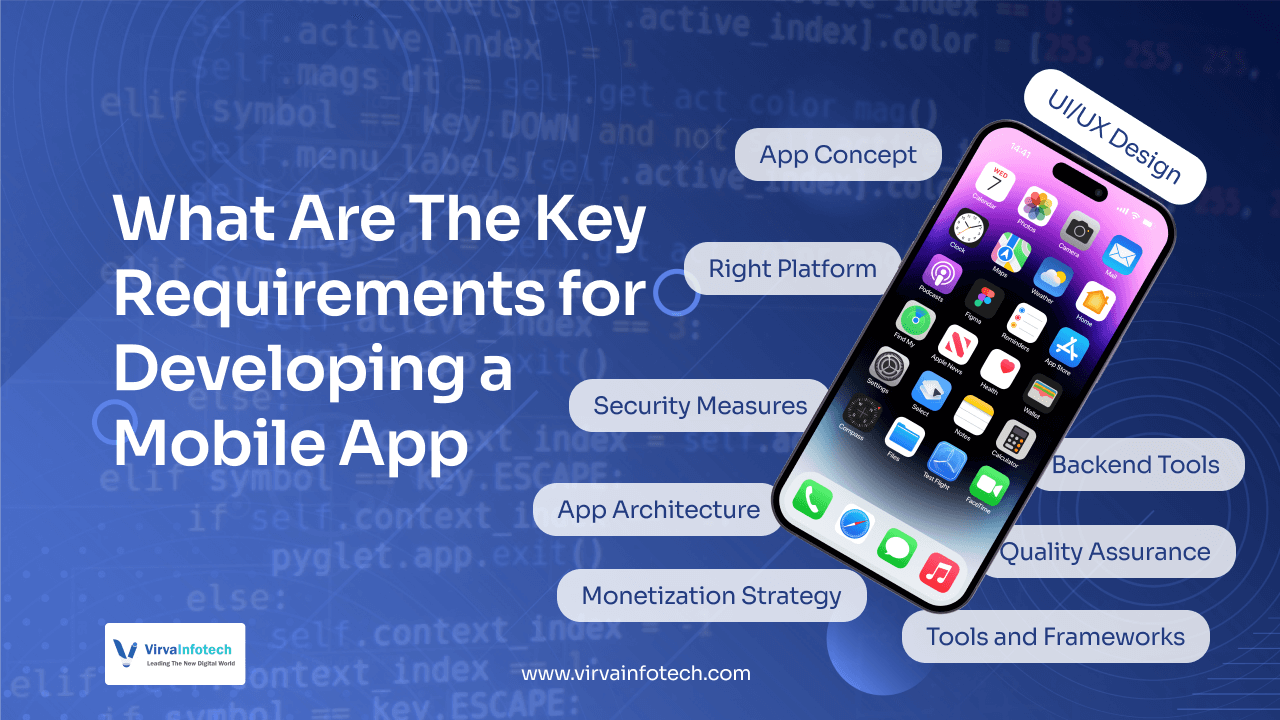Posted At: Jan 13, 2024 - 801 Views

Mobile apps today form the proverbial backbone of speedy and moving goings-on in a dynamic digital space. They simply serve as hold-facks offering value, requirements, and experience to businesses, startups, and individual users. Millions clamouring for attention on the Google Play Store and Apple App Store make combining planning, technical know-how, and a user-first approach imperative to create a genuinely great mobile app. An indispensable guide through the key requirements in building mobile apps will add on a business director, developer, or entrepreneurial mind to be well-grounded in the app-making trade.
This all-in-one guide takes you through the most critical steps, requirements, and best practices for developing a mobile app, adding major features, and boosting its reach and performance. Popular search terms and keywords will also be included to assist you in tailoring your app development with the industry's trends. Let the journey begin!
1. Define Your App’s Concept, Purpose, and Target Audience
Every successful application must have a straightforward idea and purpose for its establishment beforehand diving into development:
Identify what problem will be solved by the app or the value it would create.
Understand the audience targeted, their preferences, their needs, and pain points.
Research market trends, competing applications, and market voids.
A clear vision helps you:
Develop unique selling propositions (USPs).
Expecting app features in alignment with users.
Develop effective use of development resources.
2. Choose the Right Platform: iOS, Android, or Cross-Platform
Choosing the right platform is a critical decision that ties directly to your audience and your objectives:
IOS Development: Those who can afford to spend more are the focus of iOS development.
Android Development:The global market for Android development is extending its reach. This is advantageous.
Cross-Platform Development: The use of tools like Flutter and React Native enables cross-platform development with a shared codebase.
Key considerations:
Budget: Can afford this more in cross platforms, but features specific to the given platforms lose prowess.
Audience Insight: Bet on the penetration of that platform by each one of your target demographics.
3. Focus on UI/UX Design: Create an Engaging User Experience
The significance of UI design and UX design on the success of an app is undeniable. A smooth and intuitive design can definitely make or break an app:
Responsive layout for all devices.
Consistency in navigation and design principles.
Employ visual hierarchy for the prominence of essential features.
User testing for feedback to improve the design.
Design Tips:
Keep the interface simple-sounding.
Optimize for speed and usability.
Convey engaging images without sacrificing functionality.
4. Select the Right App Architecture: Build a Scalable Solution
Application architecture determines the performance, scalability and maintainability of your application in the future. Some of the popular and standard architecture patterns include:
MVC (Model-View-Controller)- to facilitate easy app design and data flow.
MVP (Model-View-Presenter)- for use in complex applications.
MVVM (Model-View-ViewModel)- advocates proper separation of logic and presentation.
A well-structured app architecture:
Reduces technical debt;
Facilitates easy update capabilities as growing apps; and
Heightens performance and maintainability.
5. Backend Development: Power Your App’s Core Features
Robust backend infrastructure is necessary for apps that require:
User authentication and data management.
API integrations with third-party services.
Real-time updates and cloud storage.
Popular Backend Tools:
AWS: Reliable and scalable cloud solutions.
Firebase: Great for real-time apps.
Node.js, Django, or Laravel: Frameworks for custom backends.
6. Use Development Tools and Frameworks: Streamline Coding
Deciding on the appropriate tools and frameworks expedites development:
Android Studio: The best one out of all Android development tools.
Xcode: The in-house IDE for iOS development by Apple.
Flutter, React Native, and Xamarin: There are cross-platform frameworks that enable quicker coding.
Leveraging robust tools ensures:
Speedier debugs and tests.
Effective code management.
Deployment efficiency.
7. Thorough Testing and Quality Assurance: Deliver a Flawless Experience
Testing is crucial to ensure your app performs flawlessly. Conduct:
Functional Testing : Different features should work as intended.
Conduct Performance Testing : The speed and load time of the application should be measured.
Usability Testing : Improve user-friendliness.
Security Testing : Identify vulnerabilities.
Use automation tools likeSelenium, Appium, and JUnitto streamline testing.
8. Implement Security Measures: Protect User Data
Concerns of security would not require negotiation; even the application would not be an exception against data breach or intrusion. Such steps are;
Encrypt sensitive data.
Interpret secure authentication mechanisms.
OWASP guidelines for secure coding.
Regular security updates help you stay ahead of potential threats.
9. Develop a Monetization Strategy: Maximize App Revenue
In case your app is designed for commercial use, explore the potential revenue models by following these options:
In-App Purchases: Sell premium features.
Subscriptions: Generate recurring revenue.
Ad Integrations: Leverage in-app advertisements.
Align your revenue strategy with your app's purpose and user expectations.
10. Optimize for App Stores: Enhance Discoverability with ASO
App store optimization is one of the most important issues that can increase the visibility of current applications and help to obtain more app downloads.
Use appropriate terms in both your app title and description.
Construct readable app icons and visuals.
Acquire feedback to improve app visibility.
Regularly analyze ASO metrics to refine your strategy.
Conclusion
Techniques sorely needed in an advanced mobile application include nimbleness, imagination, and cleverness. It should constitute promptly determine elements like identifying the idea, launching, and publicizing it in the app stores, and other related activities that would secure an early start in the setting up of successful app marketing. Work superbly on giving the best experience to users, installing good security and a rapidly changing pace, which must involve both user feedback and the industry trends.
The stages of development do not stop at launching the application. It goes beyond performance measurement, reading, and evolution according to the new demands from the users. Thus, these are some essential steps in developing the application that makes an excellent one and provides value to the audience over time.
Frequently Answers & Questions
1. Question: What is the first step in developing a mobile app?
Answer: Begin by defining your app's concept, purpose, and target audience. Understanding the problem your app will solve and who it serves is crucial. This clarity guides the entire development process.
2. Question: What are the functional requirements in mobile app development?
Answer: Functional requirements specify the actions your app must perform, such as user authentication or data processing. Clearly defining these ensures the app meets user needs. They form the foundation for your app's features.
3. Question: Why is market research important before developing a mobile app?
Answer: Market research helps identify user needs, preferences, and existing competition. This information guides feature development and positioning. It increases the likelihood of your app's success.
4. Question: How do I choose the right development team for my mobile app?
Answer: Look for a team with experience in your app's platform and industry. Assess their portfolio and client reviews. Effective communication and a collaborative approach are also crucial.
5. Question: What are the key performance indicators (KPIs) for a mobile app?
Answer: KPIs include user acquisition rates, retention rates, average session duration, and revenue per user. Monitoring these metrics helps assess app performance. They inform future development decisions.


